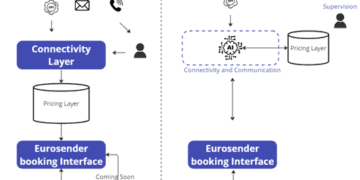In the realm of global commerce, the integration of Artificial Intelligence (AI) is marking a significant shift in the logistics industry, streamlining operations and enhancing efficiency in international shipping service. Luxembourg-based digital logistics platform Eurosender is at the forefront of this transformation, leveraging AI to redefine the booking and management of cargo shipments.
Eurosender innovative approach, developed in collaboration with Luxembourg’s Centre for Security, Reliability, and Trust (SnT), focuses on utilizing AI to accurately match supply with demand within the logistics market. This not only promises to lower costs but also to minimize the environmental footprint of transportation. The company employs sophisticated algorithms to sift through millions of shipping quotes, simplifying the booking process for users and making it more efficient.
The rapid adoption of AI technologies, such as Chat GPT—now boasting over 100 million daily users—signals a paradigm shift in how consumers interact with online services, including logistics. Eurosender’s CEO, Jan Štefe, anticipates a significant move away from traditional search engines towards AI-driven platforms for service procurement. This transition poses a challenge for the industry: to integrate complex supply chain solutions with user-friendly interfaces.
Eurosender’s platform exemplifies this new wave of service delivery, where users can effortlessly initiate shipments by uploading an item’s image. The AI then determines the item’s dimensions, identifies the optimal logistics provider, and facilitates order placement, significantly reducing the complexity traditionally associated with shipping.
Behind the scenes, AI’s impact on logistics extends to the operational backbone of the industry. Currently managed by humans assisted by technologies like APIs for system integration, the future lies in “intelligent agents.” These AI systems are envisioned to autonomously select service providers, combine transport modes, and oversee logistics operations, eliminating the need for human intervention in complex logistical tasks.
This shift towards AI-driven logistics is expected to drastically improve efficiency, particularly by reducing the prevalence of empty truck journeys, which currently constitute around 22% of road transport in the EU. An intelligent logistics network could seamlessly coordinate the entire shipping process from origin to destination without human error, streamlining international trade flows.
Eurosender’s collaboration with SnT is just the beginning of building a more connected and intelligent logistics network. The initial focus is on enhancing system connectivity to analyze vast amounts of data for better decision-making. Subsequent phases will address pricing strategies and, eventually, the full integration of AI for autonomous logistics management.
As Eurosender and similar companies advance AI applications in logistics, the potential for more efficient, sustainable, and user-friendly shipping processes becomes increasingly tangible. This revolution in logistics not only promises to elevate the industry’s operational standards but also positions companies like Eurosender at the helm of global trade innovation.
Stay on top of supply chain logistics news updates at The Supply Chain Report. Visit ADAMftd.com for free international trade tools.
#ArtificialIntelligence #Logistics #Eurosender #DigitalLogistics #AIDriven #SupplyChain #Sustainability #GlobalCommerce #CargoShipping #SmartLogistics #Innovation #Efficiency #IntelligentAgents #ShippingSolutions #TransportOptimization















